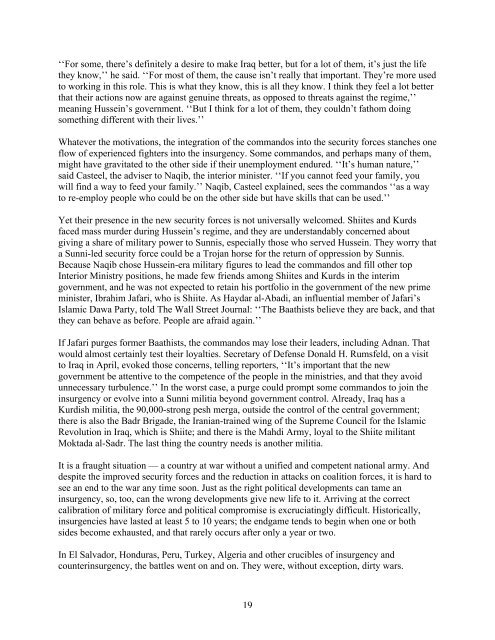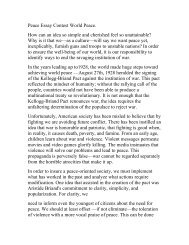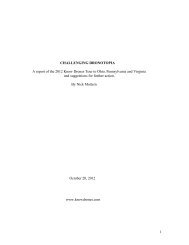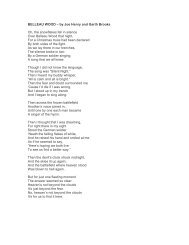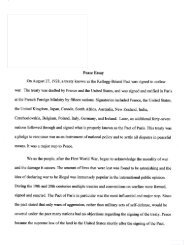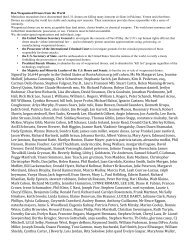US Training of Death Squads in Iraq? - War Is A Crime .org
US Training of Death Squads in Iraq? - War Is A Crime .org
US Training of Death Squads in Iraq? - War Is A Crime .org
Create successful ePaper yourself
Turn your PDF publications into a flip-book with our unique Google optimized e-Paper software.
‘‘For some, there’s def<strong>in</strong>itely a desire to make <strong>Iraq</strong> better, but for a lot <strong>of</strong> them, it’s just the lifethey know,’’ he said. ‘‘For most <strong>of</strong> them, the cause isn’t really that important. They’re more usedto work<strong>in</strong>g <strong>in</strong> this role. This is what they know, this is all they know. I th<strong>in</strong>k they feel a lot betterthat their actions now are aga<strong>in</strong>st genu<strong>in</strong>e threats, as opposed to threats aga<strong>in</strong>st the regime,’’mean<strong>in</strong>g Husse<strong>in</strong>’s government. ‘‘But I th<strong>in</strong>k for a lot <strong>of</strong> them, they couldn’t fathom do<strong>in</strong>gsometh<strong>in</strong>g different with their lives.’’Whatever the motivations, the <strong>in</strong>tegration <strong>of</strong> the commandos <strong>in</strong>to the security forces stanches oneflow <strong>of</strong> experienced fighters <strong>in</strong>to the <strong>in</strong>surgency. Some commandos, and perhaps many <strong>of</strong> them,might have gravitated to the other side if their unemployment endured. ‘‘It’s human nature,’’said Casteel, the adviser to Naqib, the <strong>in</strong>terior m<strong>in</strong>ister. ‘‘If you cannot feed your family, youwill f<strong>in</strong>d a way to feed your family.’’ Naqib, Casteel expla<strong>in</strong>ed, sees the commandos ‘‘as a wayto re-employ people who could be on the other side but have skills that can be used.’’Yet their presence <strong>in</strong> the new security forces is not universally welcomed. Shiites and Kurdsfaced mass murder dur<strong>in</strong>g Husse<strong>in</strong>’s regime, and they are understandably concerned aboutgiv<strong>in</strong>g a share <strong>of</strong> military power to Sunnis, especially those who served Husse<strong>in</strong>. They worry thata Sunni-led security force could be a Trojan horse for the return <strong>of</strong> oppression by Sunnis.Because Naqib chose Husse<strong>in</strong>-era military figures to lead the commandos and fill other topInterior M<strong>in</strong>istry positions, he made few friends among Shiites and Kurds <strong>in</strong> the <strong>in</strong>terimgovernment, and he was not expected to reta<strong>in</strong> his portfolio <strong>in</strong> the government <strong>of</strong> the new primem<strong>in</strong>ister, Ibrahim Jafari, who is Shiite. As Haydar al-Abadi, an <strong>in</strong>fluential member <strong>of</strong> Jafari’s<strong>Is</strong>lamic Dawa Party, told The Wall Street Journal: ‘‘The Baathists believe they are back, and thatthey can behave as before. People are afraid aga<strong>in</strong>.’’If Jafari purges former Baathists, the commandos may lose their leaders, <strong>in</strong>clud<strong>in</strong>g Adnan. Thatwould almost certa<strong>in</strong>ly test their loyalties. Secretary <strong>of</strong> Defense Donald H. Rumsfeld, on a visitto <strong>Iraq</strong> <strong>in</strong> April, evoked those concerns, tell<strong>in</strong>g reporters, ‘‘It’s important that the newgovernment be attentive to the competence <strong>of</strong> the people <strong>in</strong> the m<strong>in</strong>istries, and that they avoidunnecessary turbulence.’’ In the worst case, a purge could prompt some commandos to jo<strong>in</strong> the<strong>in</strong>surgency or evolve <strong>in</strong>to a Sunni militia beyond government control. Already, <strong>Iraq</strong> has aKurdish militia, the 90,000-strong pesh merga, outside the control <strong>of</strong> the central government;there is also the Badr Brigade, the Iranian-tra<strong>in</strong>ed w<strong>in</strong>g <strong>of</strong> the Supreme Council for the <strong>Is</strong>lamicRevolution <strong>in</strong> <strong>Iraq</strong>, which is Shiite; and there is the Mahdi Army, loyal to the Shiite militantMoktada al-Sadr. The last th<strong>in</strong>g the country needs is another militia.It is a fraught situation — a country at war without a unified and competent national army. Anddespite the improved security forces and the reduction <strong>in</strong> attacks on coalition forces, it is hard tosee an end to the war any time soon. Just as the right political developments can tame an<strong>in</strong>surgency, so, too, can the wrong developments give new life to it. Arriv<strong>in</strong>g at the correctcalibration <strong>of</strong> military force and political compromise is excruciat<strong>in</strong>gly difficult. Historically,<strong>in</strong>surgencies have lasted at least 5 to 10 years; the endgame tends to beg<strong>in</strong> when one or bothsides become exhausted, and that rarely occurs after only a year or two.In El Salvador, Honduras, Peru, Turkey, Algeria and other crucibles <strong>of</strong> <strong>in</strong>surgency andcounter<strong>in</strong>surgency, the battles went on and on. They were, without exception, dirty wars.19


